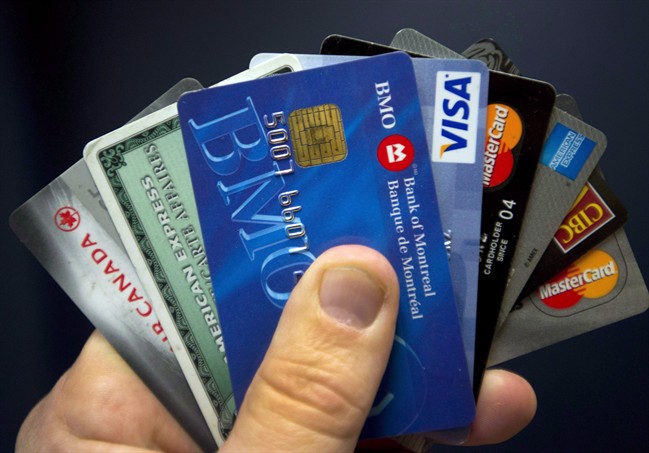Canadians’ demand for credit reached a record high in the first three months of the year, according to data by credit report bureau Equifax. Credit inquiries rose by 3.6 per cent compared to the final months of 2016, with total debt rising by nearly 7 per cent to more than $1.7 trillion.

On average, Canadians carry $22,125 in non-mortgage debt, which includes credit cards and many lines of credit, the numbers show.
But despite growing debt loads, Canadians are mostly keeping up with their bills. The national delinquency rate remained stable at a mere 1.15 per cent.
Strong economic growth and low unemployment in most of the country are likely helping many overstretched borrowers stave off bankruptcy, as Global News has reported before.
READ MORE: Canadians have more debt than ever, but fewer are going bankrupt. Why?
And in many areas, soaring housing prices are allowing homeowners to refinance significant amounts of unsecured debt through a second mortgage or a home equity loan.
WATCH: Canadian families are going deeper into debt while the housing market is still hot

But not everywhere looks the same. Average debt loads vary significantly, with Calgary residents carrying over $28,800 on average in credit card debt and consumer loans — the record for major cities.
And delinquencies soared in Newfoundland, which registered an increase of nearly 24 per cent in the rate of debt repayments that were more than 90 days late.
Here’s how the provinces stack up by average consumer debt:
1) Alberta – $27,871
Calgarians carry a lot of debt but residents of Fort McMurray have even more: a whopping $37,345 on average. The province’s delinquency rate kept going up, by nearly 14 per cent compared to the first three months of 2016, but a much slower pace than through much of 2016, according to Equifax.
2) Saskatchewan – $24,462
The picture in Saskatchewan is similar to Alberta’s. Debt loads are high, but as the economy bottomed out, the delinquency growth rate is slowing down.
3) British Columbia – $23,522
In British Columbia, delinquencies were down: a 5.6 per cent decrease compared to the previous year.
4) Newfoundland – $23,314
- Gas prices surge in some parts of Canada. What’s causing pain at the pumps?
- Ontario premier calls cost of gas ‘absolutely disgusting,’ raises price-gouging concerns
- Buzz kill? Gen Z less interested in coffee than older Canadians, survey shows
- More youth are seeking EI amid rising unemployment rates: StatCan
Newfoundland may be in the middle of the pack as far as debt loads, but the province has seen delinquencies balloon as the local economy kept sputtering. “People in Newfoundland are having more difficulty making timely payments than in the other provinces,” Regina Malina, senior director of data and analytics at Equifax Canada noted.
5) New Brunswick – $22,828
The province had one of Canada’s highest delinquency rates, but that number was roughly stable compared to early 2016.
6) Nova Scotia – $22,229
Nova Scotia has Canada’s highest delinquency rate, at 1.81 per cent, a 8.2-per cent jump over the same period in 2016.
7) Prince Edward Island – $22,131
In Prince Edward Island the delinquency rate is 1.4 per cent, roughly the same as in the first three months of 2016.
8) Ontario – $22,022
Ontario, where home prices skyrocketed in early 2017 not just in Toronto but many of the province’s south, delinquencies dropped by over 6 per cent.
9) Quebec – $18,617
Quebecers have lower debt (for Canadians standards, anyways) and here, too, delinquencies dropped. They were down 5.6 per cent.
10) Manitoba – $18,312
Manitobans carry the smallest amount of consumer debt, on average, but delinquencies were up by over 10 per cent.




Comments